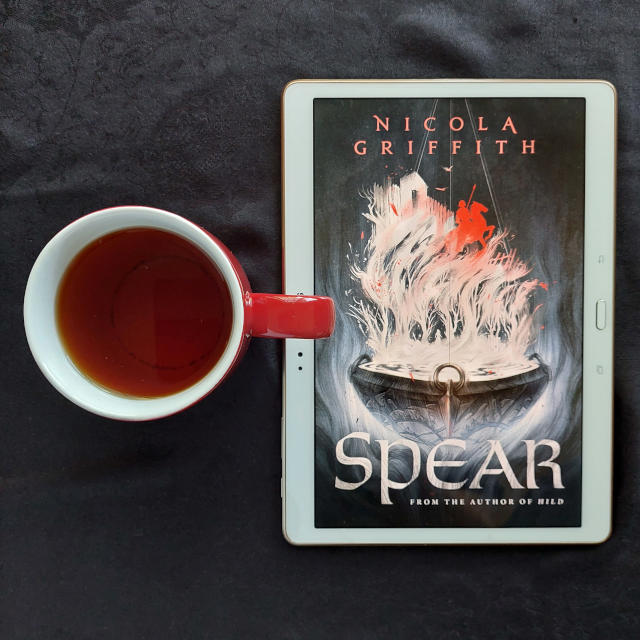Although I’m not a big fan of King Arthur and the legends of Camelot, I could not resist the promise of a queer retelling. Which is a good thing for me, because Spear was a book I genuinely savoured.
It retells the story of the knight Percival, referred to here as Peretur which is the sixth century Welsh version of the name. However, the issue of a name is a fraught one. She was raised in the wild by her mother, a mentally unstable woman who nevertheless has great magical ability and who knows that there is power in names. So for a while, the main character has no fixed name, but is referred to in different ways, depending on whether her mother is having a good day or a bad one.
Eating daily from one of the treasures of the Tuath De, Peretur grows up strong. Knowing how to speak to the animals and insects helps her to learn how to hunt and fight. One day, she saves a group of knights and knows that it is time to leave her home and meet her destiny: to become a knight and to answer the call of the Lake.
It is strange to me that this is such a short book (coming in at under 200 pages, it’s really an oversized novella) because it has the feel of an epic. The language is rich, the initial shock of it seeming almost purple before I acclimatised to its beauty. It paints a natural world that is vibrant and alive, filled with its own secrets and companions, which contributes to a sense of the mythic.
This is shored up by the interweaving of Celtic legend into the traditionally rather Christianised tales of Camelot. Although the Celtic deities nominally remain in the Overland, away from mortals, their presence and the consequence of their actions remain very present. Likewise, the four treasures of the Tuatha De Danann — the stone, the sword, the spear and the cauldron — are material items fought over by immortals and mortals alike. This interweaving brought a new angle to the story for me, making it of more interest, and was so neat it seems surprising it hadn’t been thought of before.
(Although, perhaps it has. The author’s note humourously comments on the time-honoured tradition of stealing and reworking elements, common not only to the creative process in general, but in renditions of the legends of Camelot in particular. I’m very unfamiliar with the source material and therefore not in a position to judge definitively.)
Another relatively fresh approach to the tale was the diversity of the cast. While Peretur did not read to me as trans (her pronouns were consistently she/her and there was no indication of gender dysphoria; cross-dressing seemed mostly a matter of practicality and a way of being socially acceptable in the kind of role she wanted to fill), she was most certainly queer. The king’s Companions include knights with a range of skin tones; notably, white is not the assumed default and is explicitly described where present. Nor are the knights necessarily able-bodied. Delightfully, this makes Lance a brown, disabled, bisexual man (thus subverting the love triangle I always hated by making it a triad). The author herself puts it best:
“Most importantly for me, historical accuracy also meant this could not be a story of only straight, white, nondisabled men. Crips, queers, women and other genders, and people of colour are an integral part of the history of Britain — we are embedded at every level of society, present during every change, and part of every problem and its solution. We are here now; we were there then. So we are in this story.”
Spear was the very first book I read in 2022 and it set the bar high. I was captivated by the magic of it, and its poignant longing to belong even after having the door shut in one’s face (multiple times). In the end, I don’t know whether to hope for a sequel or to simply relish this compact slice of epic.

